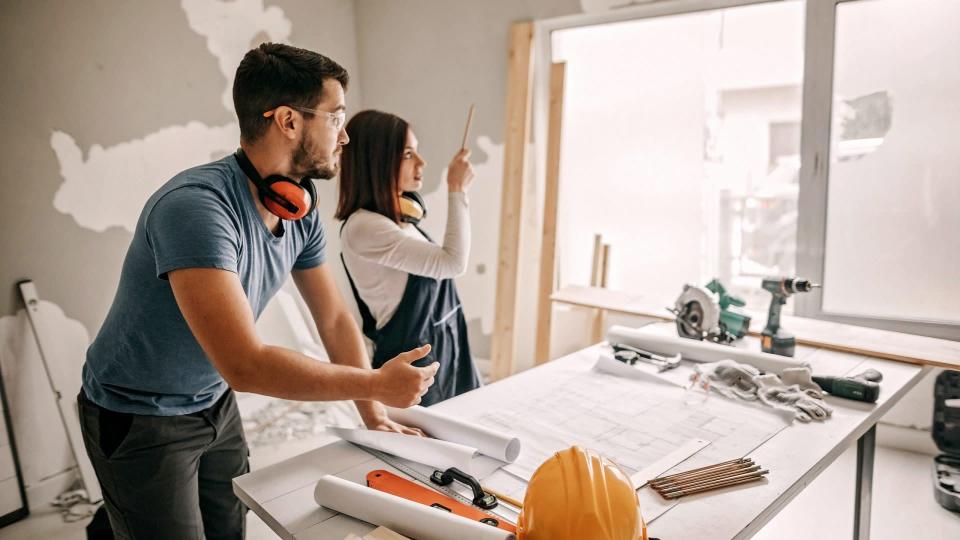[ad_1]

The housing market is red-hot and turbulent right now, so it’s no surprise that renovating a fixer-upper is often favored over purchasing something more move-in-ready. But a house in need of major repairs comes with its own set of advantages and disadvantages. A refresher on the pros and cons of fixer-uppers — and some important tips to keep in mind when purchasing one — is always a welcome thing.
See: Real Estate Investing Guru Mindy Jensen Says To Avoid These Types of Properties
Find: 11 Important Questions To Ask a Real Estate Agent Before Working With Them
Pros of Buying a Fixer-Upper Home
Whether you are buying your future forever home or investing in a house to flip, the first plus to buying a fixer-upper is the lower list price and down payment, as most fixer-uppers require major maintenance work and see less buyer competition. There is also the freedom of renovating the home to your specifications and choosing the quality and type of renovations.
Cons of Buying a Fixer-Upper Home
You are trying to save money by renovating a fixer-upper, but it is most likely still going to be quite expensive. If your renos get out of control, you may end up spending more on a fixer-upper than on a completed home. You’ll have to think about surprises concerning budgeting — and broader unexpected issues that may arise, as well as the length of the renovation. If you are living in your fixer-upper during construction, you want your uncomfortable temporary accommodation to last predicted months instead of unanticipated years.
When considering buying a fixer-upper, sometimes the things that seem unnecessary or trivial turn out to be the most important factors of your home-buying and renovating project. Some helpful tips follow.
-
Do not overpay!: The whole point of buying a fixer-upper is to save money. So, unless you must have a specific house — and can do the renos within a low, tight budget — don’t put yourself in a hole and overpay on your house. Include contingencies for the inspection and appraisal and try to negotiate a smart price.
-
Always get a home inspection: This is indispensable, especially for a fixer-upper purchase. While you will be able to see projects that need doing, a home inspector will see more. It’s their job.
-
Budgeting your renovation: Can you afford this project? Create a list of every project you desire, all suggestions from the home inspector and quotes from contractors. A ballpark figure with some fat thrown in for surprises will at least give you an idea if you can even afford to do this.
-
Figure out what permits are required: There will be a list of renovations that will require zoning ordinance and building code permitting from the municipality. Professional plans may be required for some things you don’t expect. Room additions? Most definitely. Fencing? Possibly.
-
Do it yourself: The more you can rely on yourself or cheap labor (i.e. your friends) to do the work on renovations, the more you can control costs and raise the sweat equity concerning your home. You might need to realistically ask yourself, “Am I as handy with a hammer as I think?”
-
Look into reno-specific loans: There are financing options that specifically target house costs and renovation budgets, like the Federal Housing Administration (FHA) 203(k) rehabilitation loan or Fannie Mae HomeStyle Renovation Mortgage.
Learn: 10 Hidden Costs of Buying a House
Explore: 10 Lies About Investing in Real Estate
As with any big money purchase, you must consider budget, needs, preferences, and lifestyle. The last thing you want to be saddled with is a money pit. Weigh the pros and cons carefully (and do the research properly) and you’ll find out whether this sort of purchase and renovation is right for you.
More From GOBankingRates
This article originally appeared on GOBankingRates.com: Are You Prepared for the Major Home Renovations That Come With a Fixer-Upper?
[ad_2]
Source link

More Stories
Home Renovation Secrets Every Homeowner Should Know
Sustainable Home Renovation Ideas for an Eco-Friendly Home
Home Renovation Tips to Boost Property Value